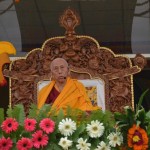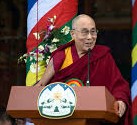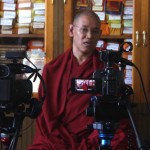The recently concluded Tibetan election has stirred up the emotions of both the exile community and its leaders.
Dissatisfaction at the “mud-slinging” campaign, where strong regional overtones were seen to overtake constructive debate, saw former Tibetan Prime Minister Professor Samdhong Rinpoche retract his vote in protest.

Prof Samdhong Rinpoche
Photo: RFA
Rinpoche has now taken steps to bring together Tibetan leaders, exhorting them to focus on the greater goal: Tibet’s cause. Speaking at Gyuto monastery, he reminded everyone to unite and work together. “We must rather focus on rectifying the mistakes in order to avoid [them] in future. It is also important that we must make efforts to enhance our collective merits,” he stated.
His words have been echoed by other community leaders including the two Sikyong candidates who made a joint and heartfelt plea for Tibetans to pull together. They each apologised for their behavior during their closely-contested battle for Sikyong and reiterated their commitment to work as one for Tibet.
This year’s election is only the second for the Tibetan community-in-exile, and the advancement of social media, together with the general public’s enthusiasm to participate made for an emotionally charged campaign that was found unsatisfactory on some counts. Samdhong Rinpoche told the Indian Daily that the candidates were “opposing each other through their individual campaigns,” rather than focusing on the core matter – Tibet.

His Holiness at the Mentsee Khang Celebration
Photo: tibet.net
Despite His Holiness the Dalai Lama’s complete devolvement from political authority, during Mentsekhang’s 100 years celebration he also expressed his concern about the slip in moral values and the region against region feel of the recent election.
His Holiness has been the guiding principal in Tibet’s recent history and does not shy away from commenting and advising where he has concerns. He has repeatedly spoken about his three commitments, the third of which compels him to work to preserve Tibet’s Buddhist culture: a culture of peace and non-violence.

Jangchup Choeden
Photo: Tibet Express
In the light of His Holiness’ disappointment, the Gelug International Foundation brought together abbots from the Gelug monasteries to discuss the way forward. Jangchup Choeden, abbot of Gaden Shartse Monastery announced three resolutions which were passed at the meeting, but not before apologising for saddening and disappointing His Holiness.
He promised that amends would be made and pledged to work on establishing and strengthening unity among Tibetan people. Thirdly, he appealed to the members of the current Kashag and the Parliament-in-exile to avoid any kind of harm or threat to the Tibetan people’s strength derived from its unity.

Dhardon Sharling Photo: Flikr
Dhardon Sharling, a member of the Tibetan Parliament-in-exile, co-chair of the International Tibet Network and General Secretary of the Tibetan Chinese PEN Association reiterated the abbot’s plea. In an interview in the Tibetan Review, she drew attention to the fact that for years Tibetans have risked arrest and even death in their fight for their country and urged everyone to look to the future.
“Our exile history stands testament to the fact that often it is the internal implosions that have presented opportunities to rectify our past and resuscitate our future. Now that the storm has passed, let us pause in the lull and take a moment to look forward to our future with a renewed sense of conviction and make some real changes. Let us take pride in our unique cultural identity as Tibetans and celebrate our Tibetaness. Let this be a historic phase in our history where we as Tibetans can reflect and rethink, learn and unlearn from our action and inaction…..We need unity in action and not in mere rhetoric. Unity means treating every Tibetan as an equal and unity happens when you weed out the differences and divisions based on region, province, faith and belief.”
Keep up to date with Election News: click here




 Print
Print Email
Email